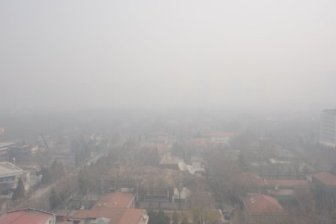 Smog hangs over Beijing Smog hangs over Beijing
|
China's central government has announced a fresh round of environmental targets, the latest sign that Beijing is getting serious about scrubbing the country's landscape of smog.
The new blueprint sets a nationwide goal to cut the concentration of harmful particles in the air by at least 10 percent over the next four years, compared to 2012 levels.
The targets are even more ambitious in heavily polluted regions. In northern China -- including Beijing, Tianjin and Hebei -- the goal is to cut particles by 25 percent, while in Shanghai and the Yangtze River Delta the target is 20 percent. In southern China's Pearl River Delta, the goal is to reduce particulate matter by 15 percent.
China's leaders face growing pressure to clean up the air as record pollution levels continue to choke the nation. It's not just the air -- anger has swelled in the world's most populous country over contaminated food and water.
Environmental standards were, in the past, low on Beijing's priority list and often overshadowed by efforts to boost economic growth. But now, there are signs the government is shifting its focus as more and more Chinese insist on a healthier environment.
The plans announced this week seek to lower China's dependence on coal -- an especially dirty fuel that China has relied on for decades. Right now, experts say China gets about 70 percent of its energy from the black stuff, a number the government hopes to reduce to 65 percent by 2017.
Industries including iron, steel, cement, chemicals, oil and gas -- areas traditionally dominated by state-owned enterprises that often rely on coal-based energy -- must develop greener production methods.
And the central government plans to stop approving coal-fired power plants in some heavily polluted industrial regions.
Some of the lost capacity could be filled by nuclear power -- an energy source the government says its looking to boost. China also plans to increase its use of clean energy like wind and solar to 13 percent of total consumption by 2017.
Greenpeace's Li Yan said that the goals constitute an "ambitious timeline."
"The targets can only be met by tackling China's coal consumption growth and the plan takes very important steps in that direction," Li said in a statement.
A study published earlier this year found that severe pollution has slashed an average of five and half years from life expectancy in northern China.
The researchers found higher rates of stroke, heart disease and cancer in people living north of China's Huai River, where the government provided free heating powered by coal boilers, a policy that resulted in significantly higher levels of pollution.
The study attributed the lost life expectancy "almost entirely due to an increased incidence of cardiorespiratory mortality."























































































































































































































































































































































